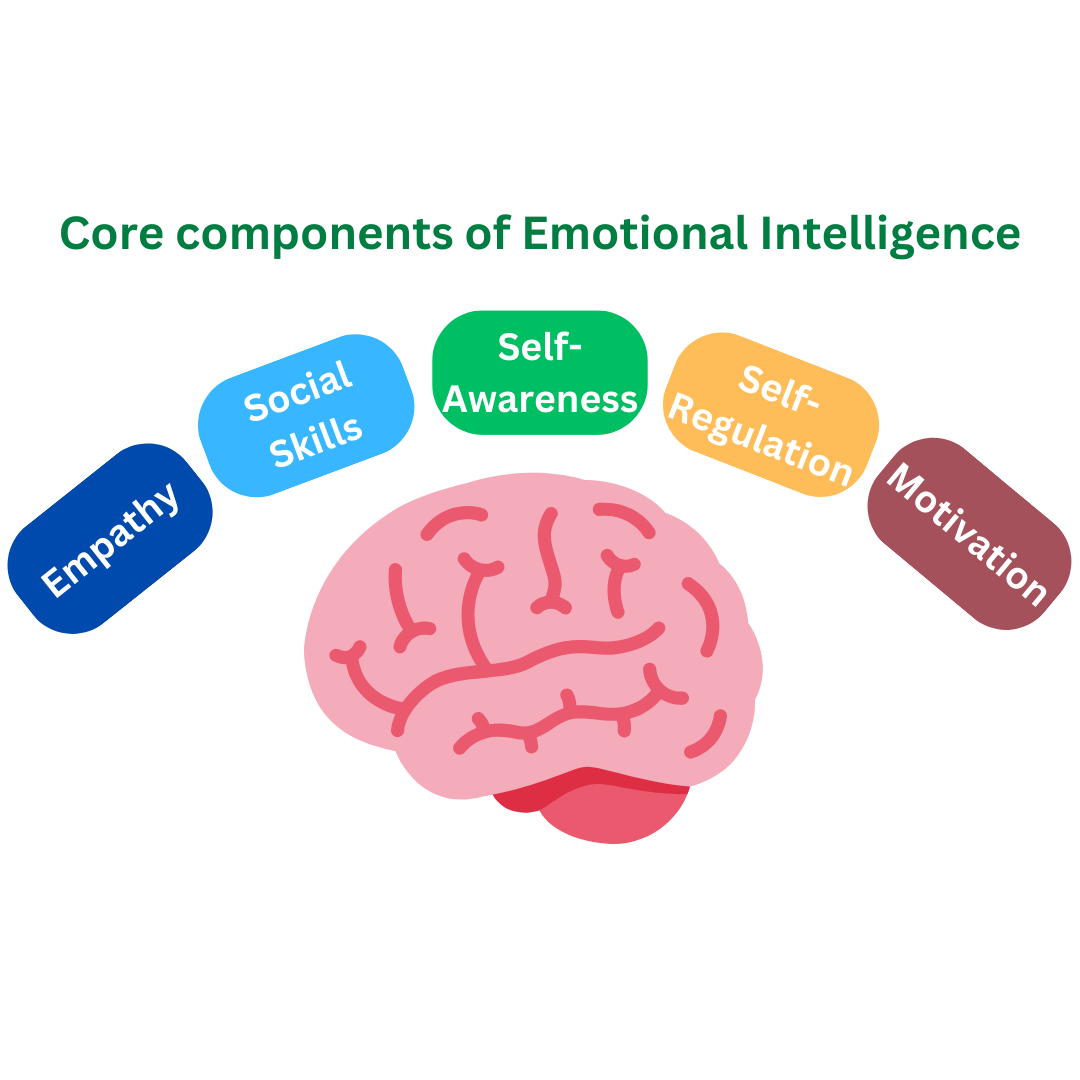What it is. Why you need it.
 Introduction to and definition of Emotional Intelligence
Introduction to and definition of Emotional Intelligence 
Emotional Intelligence. sometimes referred to as EQ (as opposed to IQ) or EI, can be defined as the ability to recognize, understand and manage our own emotions; and to recognize, understand and influence the emotions of others.
Practically speaking, this means two things:
-
Having an awareness that emotions can and do drive our behaviours and impact people in both positive and negative ways;
-
Knowing how to manage both our own and others’ emotions;
The term Emotional Intelligence was first described by two psychologists, Peter Salovey and John Mayer, in an article published in the journal Imagination, Cognition, and Personality, in 1990. The concept was popularized by Dan Goleman in his book Emotional Intelligence, in 1995 (2nd edition 2005).
According to the theory, Emotional Intelligence comprises five core components: empathy; effective communication or social skills; self-awareness; self-regulation; and motivation.

“People with high EQ can identify how they are feeling, what those feelings mean, and how they impact both their own behaviors and in turn, those of other people”. (DEIA, 2022) It is a little harder to “manage” the emotions of others: you can’t control how someone else feels or behaves.
But if you can identify the emotions behind their behaviour, you’ll have a better understanding of where they are coming from and how to best interact with them.
 How can having Emotional Intelligence help us?
How can having Emotional Intelligence help us? 
It is a scientific fact that emotions precede thought. When emotions take over, the way our brains function changes. Cognitive abilities, decision-making powers and even interpersonal skills are diminished.
Managing emotions is therefore highly beneficial in all contexts, both professional and person. It. is particularly important in situations where we are under pressure. For example when:
-
Giving /receiving feedback
-
Meeting deadlines
-
Dealing with challenging relationships
-
Not having enough resources
-
Navigating change
-
Working through setbacks and failure
Being able to understand and manage our emotions and the emotions of others can ultimately lead us to be more successful in both our personal and professional lives.
In a personal context, emotional intelligence can help us to:
-
Have uncomfortable conversations without hurting the feelings of others
-
Manage stress and the feeling of being overwhelmed
-
Improve relationships with people we care about
While at a professional level it can help us to:
-
Resolve conflicts
-
Coach and motivate others
-
Create a culture of collaboration
-
Build psychological safety within teams
 Why EQ could matter more than IQ
Why EQ could matter more than IQ 
“Research by the Harvard Business School demonstrates that EQ counts twice as much as IQ and technical skills combined in determining success” (Macnamara, 2019). Translated into the real-life context, this means that the smartest people within an organization are not necessarily always the most intelligent ones – or, ultimately, the most successful. In other words, what distinguishes the most productive employees from the average ones is EQ.
In the workplace, having high EQ implies having strong communication skills, especially in the areas of conflict management, relationship management and negotiation. Being able to communicate effectively is crucial for professional success.
In the workplace, having high EQ implies having strong communication skills, especially in the areas of conflict management, relationship management and negotiation. Being able to communicate effectively is crucial for professional success.
Employees who are self-aware and who can self-regulate their emotions are often able to avoid making impulsive decisions, as they tend to think objectively before they act. Being aware of your own feelings is also the first step in not letting those feelings control you. Recognizing how you feel and why will help you to deal with your emotions and then move forward in the most productive way.
Operating with empathy and understanding of others is a critical part of teamwork. Being able to read the emotions of your teammates will help you better manage relationships at work and make your colleagues feel supported and listened to.
 The importance of emotional intelligence in leadership roles
The importance of emotional intelligence in leadership roles 
As a student of Glion, one of your long-term ambitions may be to become a future industry leader. Indeed, developing leadership skills is a strong focus of your journey here. But did you know that you can combine the five components of emotional intelligence with leadership to become an even better and more effective leader? As we know, emotional intelligence is the human ability to recognize, understand, exploit and manage one’s emotions in a positive way. Thus leaders with highly developed EQ often find themselves to be less stressed, better communicators, more empathic and more able to overcome challenges than their counterparts with less well developed EQ. Moreover, the high EQ managers know and gauge precisely how their mental state influences the emotional reactions of those around them, allowing them to stay acutely tuned in to their teams and to the moods of the individuals within those teams.
The effectiveness of emotional intelligence in leadership is no small thing. On the contrary, it is a primary element involved in climbing the corporate ladder. Technical skills can only take you so far. The difference between a good leader and a brilliant one is the emotional element.
It is easy to grasp the five core components of emotional intelligence as outlined here. But this knowledge is of little use unless it is applied. What sets great leaders apart as more compassionate and inspirational is their ability to do just that: to understand and manage their emotions and actions by applying the principles of emotional intelligence.
Think of some of the great leaders in industry. Those who are most effective are often highly emotionally intelligent. They are self-aware and able to view things objectively. They understand their strengths and weaknesses and the importance of acting with humility. They balance this approach with empathy for their teams. And employees who feel appreciated and valued at work aren’t only happier but are more productive.
 How to evaluate Emotional Intelligence
How to evaluate Emotional Intelligence 
The benefits of having high emotional intelligence include academic achievement, decision-making abilities, and overall success in life. Consequently, we would all do well to try to evaluate our own level of emotional intelligence. This can be done by a self-evaluation – by being totally honest and self-critical – or by asking a trusted friend, family member or member faculty or staff to give you a frank appreciation of how you weigh up. Specifically, consider the following questions:
-
Do I make an effort to connect with other people?
-
Do I pay attention to the content and context of group interactions?
-
Do I receive feedback well and make an effort to consciously integrate it into my behaviour?
-
Am I honest about my weaknesses and open to self-improvement?
-
Am I able to accept when I am at fault – and apologize if necessary?
-
Do I know how to practice self-care (including relaxation techniques or other forms of stress management)?
-
Do I engage in a positive way with peers/colleagues, trying to start and end the day on an upbeat note?
 How to build your overall Emotional Intelligence
How to build your overall Emotional Intelligence 
While some people are equipped with an innate emotional intelligence, for those who think they could do with increasing their skills there are fortunately some techniques that can be applied (together with a measure of thoughtfulness and practice) to enable them to improve. No matter how you have evaluated your own level of EQ, there is never any harm in seeking to improve….
-
Try to slow down your reactions to emotions. Next time you feel angry, try to sit with your feelings and reflect before lashing out. Why are you angry? Did someone upset you? What do you think was the emotion behind their behaviour?
-
Think about your strengths and weaknesses. Nobody is good at everything, and that’s okay. And normal! Know yourself and know when to ask for help– or offer it to others.
-
Pay attention to interpreting people’s non-verbal (and often unconscious) communication. If you ask someone to help you on a project and they agree, but sound hesitant, recognize that they might feel overwhelmed or confused or they come from a different background and understanding than your own. This is particularly true in an environment like Glion, where so many different cultures are brought together in such a close-knit environment. It is important to acknowledge and address any such issues before moving forward.
-
Work on your communication skills, making sure to always convey your messages effectively and openly. Your main point should be clear; eliminate information that isn’t relevant to the person you’re talking with; and always give your full attention when someone else is speaking.
-
Ask questions to understand another person’s thoughts and feelings better when you are not sure
-
Understand and accept that you may not be right all the time…
 Specific strategies targeting the Five core components of Emotional Intelligence
Specific strategies targeting the Five core components of Emotional Intelligence 
Let’s look more closely at each of the individual core components which have been identified as constituting Emotional Intelligence – and at some more particular strategies for developing each.
Empathy
Emotionally intelligent people can understand what others are going through, and therefore understand them better. This is why empathy is a key component of successful leadership. An understanding manager is approachable. They listen. Their teams are engaged, the work environment they create is harmonious.
Contrary to former beliefs, empathy today is seen as a strength, not a weakness. It is a trait that helps leaders to bond with their teams through compassion and understanding.
Empathy-building strategies
Start listening to others more, without interrupting
Try to see things from the other person’s viewpoint – particularly during a disagreement
Recognize your team, show appreciation for individual successes
Be open to share your feelings, where appropriate
Volunteer for a role in a worthy cause, or to participate in community projects
Practice mindfulness, meditation … or just being kind
Work on your body language and on reading that of others
Talk to new people
Social skills – Effective communication
Easy communication is, as we have seen, a core component of EQ. Leaders with good social skills are approachable, easy to talk to – and are consequently strong team players. Effective communication is important for leaders as it helps in the building of meaningful, mutually respectful relationships. “True emotional understanding involves more than just understanding your own emotions and those of others” (Cherry, 2022). You also need to be able to put this information to work in your daily interactions and communications. The advantages of being a good communicator include having a more persuasive influence; increased awareness of oneself and one’s team; an ability to better manage relationships and conflicts; enhanced social awareness; better leadership and mentorship abilities; an increased ability to cooperate collaboratively. Important social skills include active listening as well as verbal and non-verbal communication skills.
Strategies that improve social skills
Show interest in other people
Enhance verbal and non-verbal communication skills (particularly body language)
Notice, observe and learn from the social skills of others
Practice confident eye contact
Ask open-ended questions (ones that need more than just a yes/no answer)
Develop a repertoire of icebreaker questions to start conversations
Listen more and practice active listening
Self-awareness:
This refers to people’s awareness of their personality, feelings, moods and behaviours, and of the effects these can have on others. Self-awareness, means understanding why you think, feel and act in a certain way. You have full awareness of your strengths and weaknesses. You know when to step back and question your thoughts and your emotional state before acting. Being self-aware helps you to quickly understand why you feel a particular way and how this affects the people around you. Having the power to influence boosts confidence, makes you a better decision-maker and improves how you relate with your team.
The more you practice self-awareness, the easier it becomes! It is suggested that people who possess self-awareness have a good sense of humour, are confident in themselves and their abilities and are aware of how people perceive them.
On the other hand, a person with low self-awareness might not understand their feelings and reactions in a given situation, leading him or her to have inappropriate, and potentially damaging, reactions.
Strategies to develop self-awareness
Be mindful of your strengths and weaknesses, thoughts and emotions
Identify your triggers to help manage your emotions
Ask for constructive feedback from people you trust
Keep a journal so you can reflect and learn from your experiences
Consider how your actions affect those around you
Use positive self-talk; set goals
Develop a growth mindset; practice mindfulness; meditate
Pursue your passions; learn new skills
Self-regulation
To self-regulate is to turn negative thoughts and feelings in to positive ones and to know when to pause between emotions and subsequent actions. A leader who self-regulates can channel negative emotions in a productive rather than destructive manner. This positive outlook makes it easier to solve problems with a cool head. Self-regulation is a critical skill for effective leadership, as it allows one to express oneself calmly and appropriately in front of colleagues. Self-regulation leads to the development of resilience. The more resilient you grow, the easier it gets to recover from setbacks; and the more conscientious, flexible in approach and comfortable with change you become.
Self-regulation is not about hiding your emotions, it is more about expressing them appropriately, waiting for the right time and place. ” Those who are skilled in self-regulation tend to be flexible and adapt well to change” (Cherry, 2022). They are generally good at managing conflict or diffusing tense and difficult situations. Conscientious, they tend to be thoughtful about how they influence others, and they take responsibility for their own actions.
Strategies for developing self-regulation
Be attentive to your thoughts and feelings
Learn to accept your emotions and try to become more emotionally resilient
Develop distress tolerance skills to handle negative emotions
Learn to view every new challenge as an opportunity
Understand that there is always a choice in how you respond
Learn to take responsibility for your actions
Stay mindful of your moral values while leading your team
Motivation
Motivation is a critical component of emotional intelligence for leaders. No team will be at its best if its leader lacks internal motivation. A driven manager is passionate, dedicated, and highly focused on achieving goals. Motivated managers exude optimistic disposition, and optimism is infectious, lifting employee morale and drive. Action-oriented, committed and good at taking initiative, self-motivated leaders continuously set high goals and have a genuine desire to achieve them. That means that you will constantly push to do more and be better, never reaching the top – because a new goal will always appear on the horizon to have you striving constantly forward. “People who are emotionally intelligent are motivated by things beyond external rewards like fame, money, recognition and acclaim” (Ottawa University, 2022).
Strategies to develop motivation
Set small, measurable, realistic goals
Introduce interesting challenges to keep up momentum
Celebrate incremental achievements not only end goals
Find intelligent ways to turn obstacles into opportunities
Be mindful of your role as a leader and its direct effect on your team
Reflect on your progress and look for ways to do better
Be open to change
 How to deal with low emotional intelligence in others
How to deal with low emotional intelligence in others 

Given all that has been said above, it follows that, generally speaking, a person with low EQ would have difficulty recognizing, understanding and reacting appropriately to their own and to others’ emotions. Such a person may have difficulty maintaining relationships due to a lack of social skills, and have difficulty empathizing with other people. They may also find It hard to regulate their emotions and to use them to guide appropriate behaviours.
It can be difficult to develop and maintain a relationship with someone who has low EQ. In a personal context, we don’t necessarily have to develop friendships with everyone. However, in certain instances, and in the professional environment particularly, we may not have the choice: contact may be unavoidable. In such instances, the more emotional intelligence – and therefore open-mindedness – you possess, the more success you should have in your dealings with low EQ people, particularly if you try some of the following:
-
Accepting the person as they are: focus on the positive aspects of their personality beyond the negative ones.
-
Encouraging change: it may be possible to help someone to improve their EQ by gently encouraging certain changes, such as by suggesting strategies for de-stressing and self-soothing.
-
Putting in the effort to listen: people with low EQ can become easily frustrated if they feel as though they are being misunderstood. Try to help keep the person calm by listening to them and engaging with what they are saying.
-
Focusing on facts: a person with low EQ can find it difficult to recognize how others are feeling (Medical News Today, n.d.). When talking with someone with low EQ, confusion can be avoided by focusing on facts rather than emotion. It may sometimes be necessary to explain your feelings rather than expecting the person to pick up on them.
 Summary and conclusion
Summary and conclusion 
“Possessing strong emotional intelligence skills can have a number of positive effects on a person’s life” (Cherry 2022). People who have such skills always seem to keep their cool, handle even the most awkward social situations with grace (Cherry, 2022). They always seem to make others feel at ease.
Emotional intelligence can help you in the following ways:
-
Leadership: emotional intelligence allows you to be a more effective leader
-
Communication: understanding how others are feeling allows you to communicate with them better
-
Self-knowledge: being more aware of what you are feeling allows you to understand yourself more deeply
-
Self-control: being aware of your emotions also allows you to develop your self-control abilities
-
Stress management: managing your emotions effectively allows you to exert greater control in situations marked by stress or conflict
(Adapted from Cherry, 2022).
In summary, having emotional intelligence allows you to feel greater empathy for people around you. This skill plays an important role in developing and maintaining personal and professional relationships. Creating strong connections with other people allows you to foster and strengthen a social support network, which plays a pivotal role in both physical and mental health.
Emotional intelligence is an essential skill for people in all professions and in all walks of life. As an undergraduate student, in can help you to navigate the many challenges and opportunities of college life. As a young professional, particularly in the service and luxury sectors, it is indispensable for ensuring career progression and success.
Developing emotional intelligence requires recognizing and managing your own emotions, practicing empathy, communicating effectively, taking responsibility for your own actions, learning from your experiences and being open minded. By taking steps to develop your emotional intelligence you will see the benefits in all aspects of your personal and professional relationships, lead a more fulfilling life, and vastly improve your professional success and career prospects.
 References & Further resources
References & Further resources 
References
Cherry, K. (2022, January 26). Emotional intelligence skills: 5 components of EQ. Verywell Mind. https://www.verywellmind.com/components-of-emotional-intelligence-2795438.
Goleman, D. (2005). Emotional Intelligence: Why it can matter more than IQ (2nd ed.). Random House.
Macnamara, N. (2019, May). The role of emotions in therapeutic care. CETC. https://cetc.org.au/be-more-affective-to-be-more-effective/
Medical News Today. (n.d.). Low emotional intelligence: What to know. https://www.medicalnewstoday.com/articles/low-emotional-lintelligence
Milennium Change Corporation (2022). DEIA strategic plan 2022-2026. https://www.mcc.gov/resources/doc/report-deia-strategic-plan
Ottawa University. (2022). Why emotional intelligence is important in the workplace. https://www.ottawa.edu/online-and-evening/blog/october-2020/the-importance-of-emotional-intelligence-in-the-wo.
Salovey, P., & Mayer, J. D. (1990). Emotional intelligence. Imagination, Cognition and Personality, 9(3), 185–211. https://doi.org/10.2190/DUGG-P24E-52WK-6CDG
For further information
Goleman, D., & Boyatzis, R. (2017, February 6). Emotional Intelligence has 12 elements. Which do you need to work on? Harvard Business Review. https://hbr.org/2017/02/emotional-intelligence-has-12-elements-which-do-you-need-to-work-on
Malone, P. (2021). Emotional intelligence in talent development. Association for Talent Development.
Psychology Today (n.d.). Emotional intelligence. https://www.psychologytoday.com/gb/basics/emotional-intelligence
 Contact us
Contact us 
The Welfare team:
The Learning Support team:












